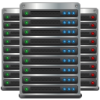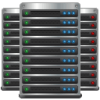Making the Move to a Dedicated Server

 Although it can be a bummer, there does come a time when all of us have to grow up, fly the nest and make it on our own terms. In the Web world, that usually means making the big move from a shared hosting package to a dedicated hosting service.
Although it can be a bummer, there does come a time when all of us have to grow up, fly the nest and make it on our own terms. In the Web world, that usually means making the big move from a shared hosting package to a dedicated hosting service.
Dedicated servers are those that are leased by a website owner and isn't shared with anyone else, improving flexibility by giving them full control over how their server is used.
This is a big and often expensive change for a site owner to make, so naturally he or she is going to have a few questions first. Thankfully, they have to look no further, because this guide will help them better understand what they need to know before making the move to a dedicated server.
Why would I want to make this change?
There are many benefits to switching to a dedicated server, if your Web properties are ready and in need of them. Dedicated servers are great for eliminating downtime, improving backend performance and email delivery, increased speeds and full administrative control on the part of the user; in many cases, they can even lower costs and increase their return on investment (ROI) in the long run.
Once your website starts to see about 2000-3000 daily unique visitors, chances are it's time to start considering making the switch. Alternatively, if your site serves downloads or streams media, dedicated servers can drastically improve your site's performance.
How much is this going to cost me?
Yeah, this is obviously an important question. Giving an exact answer is obviously close to impossible, because much of it is dependent on (A) the service provider you purchase it from and (B) your business' size and unique needs. As a small business, you can likely find prices as low as under $100 a month, although generally these will be discount offers for older/cheaper machines. In general, your price range will start around $150-$200 for a bare bones package, with additional increases for extras you may need to add.
Enterprise-level companies, however, can start paying around $400 a month, but more realistically for a company that size, a basic starter package will run at least $600, if not far more. Of course, a lot of this is just conjecture, and every website owner is going to have to work with a hosting service provider to find the price that best suits their unique needs while providing the best value.
Do I want managed or unmanaged hosting?
Once you start shopping around, you're going to hear the terms "managed" and "unmanaged" thrown about. With an unmanaged server, you, the site owner, are fully responsible for all of the troubleshooting, maintenance, applications and security of the server. Managed servers, on the other hand, are taken care of by the hosting company, including updating (usually on demand), based on your specific desires. Because of the costs associated with maintaining a managed server, these offerings tend to cost more than unmanaged options.
The biggest downside to unmanaged servers (or upside to managed servers) is that they require a lot of time and resources, not to mention the knowledge, to operate them that many business owners just don't have. An unmanaged server may be a great choice for a larger company with a dedicated IT department and/or the money to hire a third-party to manage it, but for the average SMB owner, with already limited time and resources, managed servers are probably the best way to go.
What hardware considerations should I keep in mind?
Since the reason most companies move to dedicated servers is because they need more flexibility from their hosting service, it makes sense that you'll want to bear these considerations in mind as you select the server hardware you're going to buy. Every server comes with physical constraints that will limit how much you can do with it, so if you don't choose wisely, you'll be running the risk of encountering the same problems you switched to a dedicated server to avoid.
Hardware specs to keep in mind with regard to a dedicated server include speed, storage space, how much RAM comes with it and how much you can add and whether the server will come with one or multiple CPUs.
It's your job to know your system requirements for both your current needs and future expectations so that you can select the server that will benefit your business for the foreseeable future. Almost always, hosting service providers will provide a variety of basic packages that offer a different set of hardware specifications, but then users can add to a package (for additional fees) to increase the server's flexibility and meet their individual needs.
What other specifications should I be concerned with?
Beyond hardware, the most important thing to consider is bandwidth. You need to check with the service provider to see exactly how much bandwidth you'll receive with the service, making sure that you select a server that can provide you with more bandwidth than what you estimate needing, just in case. Selecting a package that offers enough bandwidth is absolutely crucial, so make sure you do your homework. Also, make sure you understand the provider's bandwidth policy, specifically how much you'll be charged should you happen to exceed your bandwidth allowance, if they notify you immediately in this case and if they can or will suspend your account in these instances.
For some users, it may be important to utilize a specific operating system on your dedicated server. Many of these packages come with a basic Linux or Unix open source system with no charge, but you can also take advantage of commercial operating systems, like Microsoft's Windows Server or Linux's Red Hat Enterprise. There is also a wide variety of free open source operating systems on the market. The choice of OS is going to be largely based on the feature set and management options required by your business
Finally, if you use, or plan to use, software or applications to run your website, it's necessary to ensure that the hosting platform and package that you choose is able to work with these specific tools. Most providers will allow you to select any software you want to put on the server, including operating system, database and various applications, but sometimes, providers will charge you a fixed monthly price to run certain software packages.
How can I be sure my data is secure?
For many businesses, security is priority number one with regard to issues of Web hosting, even more so when a business keeps highly sensitive data on hand. The good news is that dedicated servers are far more secure than their shared counterparts, since only your individual website information will be hosted on it, which keeps your data from being open to attacks on other sites.
Still, things happen and there is always a possibility that a technological malfunction could result in a loss of data. This means that frequent data backup is absolutely crucial. If you're running an unmanaged server, that means making sure you routinely backup critical information on a regular basis. If you're using a server-side management solution, know the process the manager(s) goes through to backup data, and how often they do it, as well as the security measures the provider takes to secure their servers.
Ultimately, with a dedicated server you're the one in charge and responsible for your data security, which is why you have to select a package that meets your security needs.
What about customer support?
The last major thing to look out for when choosing your dedicated server package is support. This is doubly important if you're going to try running your own unmanaged system, as you're going to need to know that you can get help should anything happen that you cannot manage or fix on your end quickly. The most important questions to ask with regard to customer support are (A) if they offer it at all (they probably do), (B) what issues customer support covers, (C) what times of the day it is available and (D) if they charge a fee for customer support, and if so, how much the fee costs.
This guide should set you on your path towards making the move to a dedicated hosting service. However, the most important thing is for you to know what your own unique needs and requirements are going to be as you begin the process of looking for the right platform and package for your website(s) to help you make the right selection at the end of the day.

Subscribe to Our Newsletter!
Latest in Marketing








